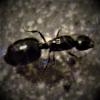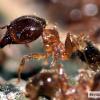As i said, you err on the side of caution, especially when (1) weighing the risks against the fact the keeping of such ants is only a hobby, and (2) there are many many other non-invasive ant species that are to be honest much more attractive. Most invasive ants are tiny and pretty much indistinguishable to laymen, and would not impress anyone not into ants.
I'll also point out native ant species so far in many of the invaded areas have not been able to, as you put it, "fight back", since many have been nearly exterminated wherever the invasive has dominated, with the resulting disruption in the environment.
I noticed that store actually has OUT OF STOCK notices for the invasive species like S. invicta and the like..so it may be that the outcry by Dr. Alfred Buschinger and Alex Wild had an effect.
The owner of the shop changed it is now run by the son of the former owner as far as I know.
That's my point species can't adapt that quickly be it in terms of fighting back (that's why invasive species are so dangerous) but also in terms of adapting to completely different climate. An ant species from the tropics or subtropics won't have enough time to adapt to moderate climate with cold winters. This process takes hundreds or even thousand years and requires a lot of colonies. That's why I still think that the chance that a tropic ant species can establish here in Germany is so tiny that I don't have to worry about it. I mean do you worry about the world being hit by an asteroid all the time? I mean there is still a chance that could happen tomorrow.
But everybody can have a different opinion I accept that. I'm still waiting for all the black painting to happen but even 18 years after the first ant store opened not a single ant species has been introduced due to ant trading or ant keeping.
Edited by Barristan, March 15 2018 - 9:50 AM.





















